The First SeminaronTeaching Reform of Journalism and Communication HistoricalTheory Course Group was held. Experts and scholars online discussed the cultivating of journalism and communication talents in the new era.
(Correspondent Zhang Jingjing, Qin Yalin, Wang Mengqing)On July 4th, Professor Ma Jianhui, ViceChairof the UniversityCommittee, delivered a speech to open “The First Seminar on Teaching Reform of Journalism and Communication Historical Theory Course Group”. He said, “As the theoretical foundation of journalism education, the journalism and communication historical theory is the fundamental element of discipline construction, and it also needs to be re-thought, condensed and constructed under the new background of times.”
The seminar was jointly sponsored by the School of Journalism and Information Communication of Huazhong University of Science and Technology, the Journalism and Communication Historical Theory Master Studio of Hubei Province, and the Journalism and Communication Historical Theory Teaching Team of Hubei Province.
More than 60 experts and scholars from nearly 30 universities in China gathered in the cloud,to jointly discuss the teaching reform of courses related to the historical theory of journalism and communication.
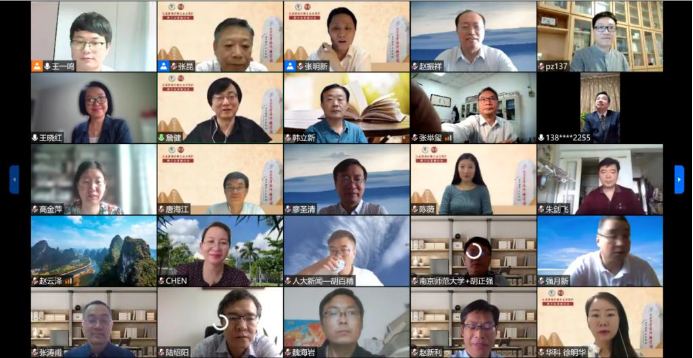
A group photo of some participants
Conference Address: Gather on the cloud, and gather the wisdom of the sages
The opening ceremony was presided over by Zhan Jian, Chair of the SJIC Committee, and Professor Ma Jianhui, ViceChairof the University Committee, delivered a speech at the opening ceremony. Chair Ma pointed out that Huazhong University of Science and Technology has contributed the most to the fight against the “COVID-19” epidemic. During this period, teachers and students of the SJIC actively participated in the epidemic relief, volunteer services, news and public opinion guidance and other work, and made positive contributions.
“Talent cultivating innovation reform is ‘only in progress, not finished’.” Professor Zhang Mingxin, Dean of the SJIC, pointed out that in the current era of technological progress, globalization development and industry change, the action logic of news communication activities, the theoretical presupposition and the core knowledge behind it all need to be re-thought and re-constructed. Under the background of new era, the SJIC further deepens the traditional idea of “interdisciplinary application of literature and engineering”, and established a new thought of “future-oriented, discipline integration, mainstream consciousness and international vision” for the cultivation of journalism and communication talents, and actively promotes reform and innovation measures to “multi-disciplinary integration”.
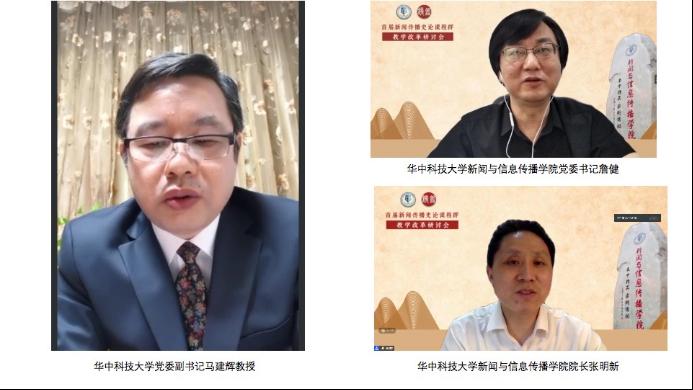
Keynote speech: talk about the teaching experience and the future of education
After the opening ceremony, experts and scholars presented wonderful theme reports on the curriculum of journalism and communication historical theory, curriculum teaching reform, cultivating of journalism and communication talents and the construction of “new liberal arts”.Professor Zhang Mingxin, Dean of the SJIC and Associate Professor Li Huajun, Vice Dean of the SJIC, were the hosts of the two lectures. Professor Gao Xiaohong, Chairman of the Teaching Steering Committee for Journalism and Communication of Ministry of Education, Director of Department of Journalism and Communication of Communication University of China, and Professor Chen Changfeng, Vice Chairman, Executive Vice Dean of the School of Journalism and Communication of Tsinghua University, and Professor Hu Baijing, Vice Chairman, Executive Dean of the School of Journalism of Renmin University of China, and other experts and scholars participated in the meetings and seminars.
The tradition and innovation of the curriculum of journalism and communication historical theory
“Only with inheritance can we truly develop a common awareness of problems, knowledge system, teaching and research style and temperament, and then create something based on diversified integration.” Professor Hu Baijing, Executive Dean of the School of Journalism of RUC, believed that the curriculum construction of historicaltheory should balance the relationship between inheritance and creation,andorient itself “toward history, study and people”, and take root in the Chinese soil to teach and research historical theory.
Professor Wang Xiaohong, Director of the Academic Affairs Office of CUC, believed that to discuss the construction of journalism and communication historical theory course group,is actually to discuss the problem of teachers. As a teacher, we should deeply grasp the “basic skills” of the subject, and think about how to construct the teaching community and new curriculum form under the modern information technology and reshape the teacher-student relationship under the co-construction of virtual space and real space.
“Innovative curriculum content, innovative teaching mode and platform, adhere to the traditional education concept and adhere to the characteristics of school.” Professor Zhang Juxi, Dean of the School of Journalism and Communication of Zhengzhou University, believed that we should strengthen the importance of journalism and communication historical theory in the era of media convergence, promote the balance between “specialists” and “generalists”, stick to the guidance of traditional education concept and Marxist view of journalism, and develop journalism and communication education with Chinese characteristics.
“Only when the reform of communication education is carried out at the curriculum level can the grand narrative of higher education reform be realized.”Professor Zhang Kun, Dean of the National Communication Strategy Research Institute of HUST, believed that the course group of journalism and communication historical theorydetermines the background color of journalism and communication major and the height, temperature and intensity of professional media personnel.He put forward the methods and paths to reform the teaching of historical theory course, such as reconstructing the curriculum system, positioning the training objectives accurately, clarifying the boundary of curriculum content, promoting the renewal of curriculum content, promoting the innovation of teaching and form, and creating a free and open classroom atmosphere.
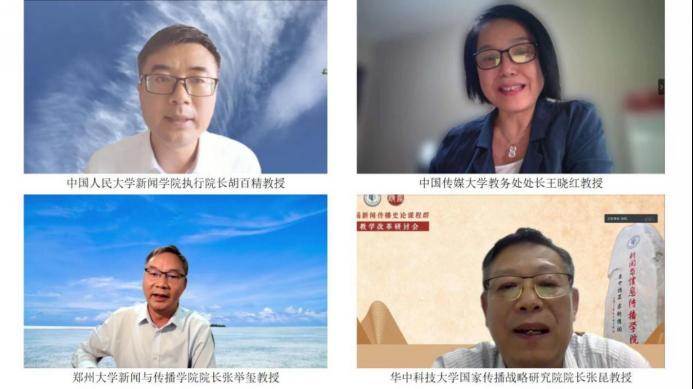
The core and direction of curriculum teaching reform
Professor Chen Changfeng, Executive Vice Dean of the School of Journalism and Communication of THU, believed that the most important thing in journalism and communication education is to cultivate students’ professional recognition ability of different media attributes, the ability to correct deviations in various public opinion environments, and the professional ability to verify the factandpublic narrative.Journalism and communication courses can be set up in the form of course groups to guide students to choose one direction to study, and corresponding research-oriented courses are provided in the graduate stage.
“Two major changes are taking place in news communication: one is the transformation of news media to information media, and the other is the transformation of news communication to information communication.”
Zhao Zhenxiang, Vice President of Xiamen University of Technology and doctoral supervisor of the School of Journalism and Communication of Xiamen University, believed that the journalists of the future should be information workers first, and the discipline of journalism and communication urgently needs to strengthen the education of theory, idea, accomplishment andethics of information communication.
Professor Lu Chaoyang, Dean of the School of Journalism and Communication of Peking University, believed that online education has set off a “learning revolution” that will change the shape of education comprehensively. The sharing of high-quality educational resources will provide a way to solve the problem of unbalanced and inadequate educationaldevelopment, and will make a large number of low-level repeated courses eliminated. But it remains to be seen whether online education will radically change the way modern universities exist.
Professor Wei Lu, Dean of the School of Media and International Culture of Zhejiang University, shared his thoughts on building a core curriculum system of journalism and communication that keeps pace with the times from three perspectives of specialty adjustment, standard update and quality improvement. He believed that teaching quality could be improved in a targeted way from six aspects: teaching team, course outline, course materials, teaching and research, course form and course feedback.
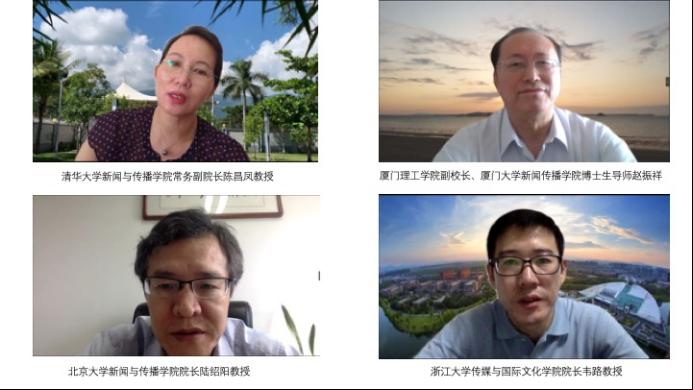
Thinking and practice of journalism and communication talents cultivating
“How to sink professional knowledge into the teaching level, to create a ‘moat’ of journalism and communication major, to farewell to short-term, flow knowledge, and grasp the long-term ‘meta-knowledge’withprofessional legitimacy and basic value is extremely important.” Said Professor Zhang Taofu, Executive Dean of the School of Journalism of Fudan University and Chair of the School Committee.
Professor Xiang Guoxiong, Vice President of Jiangxi Normal University, stressed that education refers to “people”. Journalism and communication education should focus on students’ own problems, cultivate innovative talents with strong self-development ability, teach students the most basic contents that will be useful for their whole life, and at the same time pay attention to the shaping of students’ personality.
Professor Li Benqian, Deanof the School of Media and Communication of Shanghai Jiao Tong University, believed that the curriculum construction of journalism and communication historical theory should strengthen value guidance through journalism history education, combine history and theory, and explore the construction of journalism history education curriculum system, so that students can not only master professional knowledge, but also get certain training of thinking methods and have the ability to analyze and solve practical problems.
Professor Han Lixin, Dean of the School of Journalism and Communication of Hebei University, believed that the journalism history of the Communist Party of China has rich theoretical implications, in which the theoretical space, the logic of communicatorsand the logic of actorsall provide a large pattern for thinking about knowledge construction and talents cultivating.
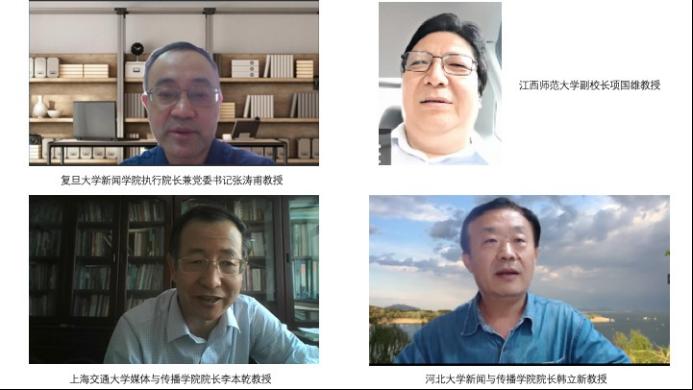
The crossing and integration of disciplines under the background of “new liberal arts”
Professor Qiang Yuexin, Dean of the School of Journalism and Communication of Wuhan University, believedthat under the background of “new liberal arts”, the cultivating of journalism talents should be closely linked with the national strategy, attach importance to the “national feeling”, attach importance to the joint training of multi-disciplinary integration, strengthen the awareness of modern science and technology, and cultivate all-media talents.
Professor Peng Zhubin, Dean of the School of Journalism and Communication of Hunan University, believed that under the background of “new liberal arts”,
curriculum integration is a prominent feature of curriculum construction, which aims to improve students’ interdisciplinary thinking ability, comprehensive practice ability and complex problem-solving ability.The cross-integration of courses mainly includes the level of liberal arts and sciences, the level of disciplines, especially the level of humanities and social sciences and the level of majors.

Theme Forum: Focus on curriculum construction and cultivate outstanding talents
In the afternoon of the same day, in the five parallel forums themed by the seminar of “Marxist view of news”, “History of Chinese and Foreign Journalism and Communication”, “Theories of Journalism Science”, “Principles of Communication Theory” and “IntroductiontoBrand Communication”,experts and scholars focused on “how to re-understand the unique position and value of journalism and communication historical theory in the cultivating of journalism and communication talents in the new era? How to take the construction of this course group as an opportunity to enhance the construction of first-class major in journalism and communication?” and so on to fully discussed, collided views and shared wisdom.
It is reported that this seminar is one of the “Journalism and Communication Talents Training Reform and Innovation Series Forum in the new era” activities, aiming to carry out a comprehensive discussion on the education reform of journalism and communication in the new era, gather collective wisdom, and exploringly and responsibly answer the questions of The Times faced by journalism and communication education.


 WeChat
WeChat